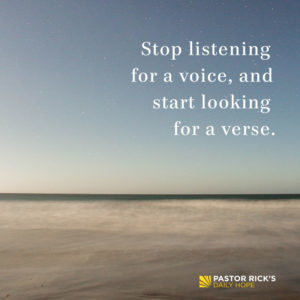Rick Warren's Blog, page 458
March 21, 2019
Cinco Maneras en que Jesús te Protege y te Dirige

“El propósito del ladrón es robar y matar y destruir; mi propósito es darles una vida plena y abundante. Yo soy el buen pastor. El buen pastor da su vida en sacrificio por las ovejas” (Juan 10:10-11 NTV).
Las ovejas por naturaleza son animales indefensos, por eso es que un pastor utiliza algunas herramientas para cuidar y proteger a sus ovejas. Él usa una vara para proteger y un cayado con un pequeño gancho para rescatar a las ovejas.
Somos como ovejas perdidas, así que Jesús vino a la Tierra para ser nuestro Buen Pastor. Así como un pastor usa las herramientas físicas de la vara y el cayado para dirección y protección, Dios quiere protegerte y dirigirte. Aquí hay cinco maneras en como lo hace:
Si le traes tus heridas, Jesús es compasivo.
Jesús tiene compasión de nosotros, porque sabe que estamos indefensos sin Él (Mateo 9:36). Él no te deja; Él te levanta. Él no te irrita; Él te sana.
“El Hijo del hombre no vino para que le sirvan, sino para servir y para dar su vida en rescate por muchos” (Mateo 20:28 NVI).
Si lo sigues, Jesús te lleva en la dirección correcta.
El Pastor va primero. Él conduce desde el frente y te llama hacia adelante. Jesús no te va a empujar por la vida. Él va a decir: “Mira cómo lo hago. Mira a donde voy”.
“Una vez reunido su propio rebaño, camina delante de las ovejas, y ellas lo siguen porque conocen su voz” (Juan 10:4 NTV).
Si te confundes o te alejas, Jesús te encontrará y te traerá de vuelta.
Cuando Dios te trae de vuelta después que te alejaste de Él, no te castigará, pero puede disciplinarte. Si un pastor tiene una oveja que es propensa a vagar, a menudo amarra la pata de esa oveja para que no pueda moverse. De la misma manera, a veces Dios nos da una cojera para evitar que vaguemos.
“Si un hombre tiene cien ovejas y una de ellas se extravía, ¿qué hará? ¿No dejará las otras noventa y nueve en las colinas y saldrá a buscar la perdida?” (Mateo 18:12 NTV).
Si fracasas o caes, Jesús te rescata y te pone en el camino de la recuperación.
Como todas las ovejas, no solo vagamos, sino que también tropezamos. Cuando vivimos confiados en que Dios nos restaurará y nos rescatará cuando fracasemos, correremos fielmente hacia Él cada vez que cometamos un error.
“Si alguno de ustedes tiene una oveja y en sábado se le cae en un hoyo, ¿no la agarra y la saca? ¡Cuánto más vale un hombre que una oveja!” (Mateo 12:11-12 NVI).
Si confías en Él para tu salvación, Jesús mantendrá su promesa de hacer precisamente eso.
No es tu trabajo salvarte. Tu trabajo es simplemente poner tu mano en la de Dios y decir: “Dios, soy todo tuyo, lo bueno, lo malo, lo feo”. Dios te ama demasiado como para dejarte ir.
“porque mi Padre me las ha dado [las ovejas], y él es más poderoso que todos. Nadie puede quitarlas de la mano del Padre.” (Juan 10:29 NTV).
La bondad de Dios significa que Él te guiará, te cuidará, te protegerá, te dirigirá y te salvará. Nadie más puede ofrecerte estos cinco beneficios. Solo vienen de Jesús, nuestro Buen Pastor.
Reflexiona sobre esto :
¿En qué dirección te está guiando Jesús en este momento? ¿En tu trabajo? ¿Tu familia? ¿Tu comunidad? ¿Tu iglesia? ¿Tus relaciones?
¿Qué has aprendido de la disciplina de Dios?
¿Confías en Dios y sus promesas de nunca dejarte y de siempre rescatarte? ¿Por qué si o por qué no?
The post Cinco Maneras en que Jesús te Protege y te Dirige appeared first on Pastor Rick's Daily Hope.
Five Ways Jesus Protects and Directs You

Sheep are essentially defenseless animals, so a shepherd uses a few tools to care for and protect his sheep. He uses a rod for guarding and protecting and a staff with a little crook in it to rescue the sheep.
We are like lost sheep, so Jesus came to Earth to be our Good Shepherd. Just as a shepherd uses the physical tools of the rod and the staff for direction and protection, God wants to protect you and direct you. Here are five ways he does that:
If you bring your hurts to him, Jesus is compassionate.
Jesus has compassion on us, because he knows that we are helpless without him (Matthew 9:36). He doesn’t put you down; he lifts you up. He doesn’t hassle you; he heals you.
“The Son of Man came not to be served but to serve, and to give his life as a ransom for many” (Matthew 20:28 ESV).
If you follow him, Jesus leads you in the right direction.
The Shepherd goes before. He leads from the front and calls you forward. Jesus is not going to push you through life. He’s going to say, “Watch how I do it. Look where I go.”
“When he has led out all of his sheep, he walks in front of them, and they follow, because they know his voice” (John 10:4 CEV).
If you get confused or wander away, Jesus will find you and bring you back.
When God brings you back from wandering away from him, he will not punish you, but he may discipline you. If a shepherd has a sheep that is prone to wander, he will often wrap that sheep’s leg so it can’t move. In the same way, sometimes God gives us a limp to keep us from wandering.
“If a man has a hundred sheep but one of the sheep gets lost, he will leave the other ninety-nine on the hill and go to look for the lost sheep” (Matthew 18:12 NCV).
If you fail or fall, Jesus rescues you and sets you on the road to recovery.
Like all sheep, we not only wander, but we also stumble. When we trust that God is going to restore us and rescue us when we fail, we’ll faithfully run to him every time we mess up.
“If any of you has a sheep and it falls into a pit on the Sabbath, will you not rescue it and lift it out? How much more valuable is a man than a sheep!” (Matthew 12:11-12 NIV).
If you trust him to save you, Jesus will keep his promise to do just that.
It’s not your job to save yourself. Your job is simply to put your hand in God’s and say, “God, I’m all yours—the good, the bad, the ugly.” God loves you too much to ever let you go.
“My Father gave my sheep to me. He is greater than all, and no person can steal my sheep out of my Father’s hand” (John 10:29 NCV).
The goodness of God means he’s going to guide you, guard you, protect you, direct you, and save you. No one else can offer you those five benefits. They only come from Jesus, our Good Shepherd.
The post Five Ways Jesus Protects and Directs You appeared first on Pastor Rick's Daily Hope.
March 20, 2019
Tres cosas para Recordar acerca de los Valles

“Aun si voy por valles tenebrosos, no temo peligro alguno porque tú estás a mi lado” (Salmo 23:4 NVI).
En Israel, en el camino de Jerusalén a Jericó, hay un cañón llamado el Valle de la Sombra de la Muerte. En su día, el rey David probablemente viajó a través de él muchas veces. Algunos de los cañones a lo largo del camino a Jericó eran estrechos en la parte inferior y tan altos como 800 pies de altura. La única forma que se puede ver la luz del sol en la parte inferior es cuando es mediodía y el sol está directamente arriba. En la Biblia, los valles son a menudo una metáfora de los tiempos difíciles, los tiempos de oscuridad, la desesperación, la derrota o el desaliento.
Salmo 23:4 dice, “Aun si voy por valles tenebrosos, no temo peligro alguno porque tú estás a mi lado” (NVI). La Biblia nos enseña que Dios es un Dios que, no solo es parte de nuestras experiencias en la cima de la montaña. Él también está con nosotros en los valles.
Hay tres cosas que debes recordar sobre los valles:
Los valles son parte de la vida. La Biblia dice en Deuteronomio 11:11, “En cambio, la tierra que pronto tomarás para ti es una región de colinas y valles, con lluvias abundantes” (NTV).
Los valles son inevitables. Todos acabamos de salir de un valle o estamos en medio de uno en este momento o nos dirigimos a otro, porque así es la vida. No puedes evitar los valles. En cambio, puedes contar con ellos.
Los valles les suceden a todos. Son imparciales. Cosas buenas les pasan a las personas malas, y las cosas malas les suceden a las personas buenas. Estamos en un mundo caído y roto, así que tenemos problemas. Nadie es inmune. Nadie está aislado del dolor. Nadie navega por la vida sin problemas.
“Los que son de Dios podrán tener muchos problemas, pero él los ayuda a vencerlos” (Salmo 34:19 TLA).
Los valles son impredecibles. No puedes planearlos. No los puedes pronosticar. Los problemas típicamente te atrapan con la guardia baja. De hecho, tus valles y tus problemas suelen aparecer en el peor momento: cuando no tienes tiempo, cuando no estás preparado y cuando es inconveniente. ¿No sería más fácil si pudieras programar todos tus valles en la vida, cuando te encuentres dormido, tu salud sea buena y nadie te esté molestando?
Proverbios 27:1 dice, “No presumas hoy de lo que piensas hacer mañana; ¡nadie sabe lo que traerá el futuro!” (TLA).
Cuando sabes que esperar cuando se trata de los valles de la vida, sabrás cómo prepararte para ellos.
Reflexiona sobre esto :
Dónde estás en tu viaje de vida ahora mismo: ¿en un valle, saliendo de un valle, en algún lugar entre un valle y la cima de una montaña, o en la cima de una montaña?
¿Cómo puedes prepararte mental, física y espiritualmente para los valles de tu vida?
¿Por qué crees que Dios te permite atravesar por valles y no solo por cimas de montañas?
The post Tres cosas para Recordar acerca de los Valles appeared first on Pastor Rick's Daily Hope.
Three Things to Remember About the Valleys

In Israel, on the road from Jerusalem to Jericho, there’s a canyon called the Valley of the Shadow of Death. In his day, King David probably traveled through it many times. Some of the canyons along the Jericho Road were narrow at the bottom and as tall as 800 feet. The only time you can see sunshine at the bottom is when it is noon and the sun is straight overhead. In the Bible, valleys are often a metaphor for difficult times, times of darkness, despair, defeat, or discouragement.
Psalm 23:4 says, “Even though I walk through the darkest valley, I will fear no evil, for you are with me” (NIV). The Bible teaches us that God is God not just a part of our mountaintop experiences. He is also with us in the valleys. There are three things you need to remember about the valleys:
Valleys are a part of life. The Bible says in Deuteronomy 11:11, “The land you will soon take over is a land of hills and valleys” (NLT).
Valleys are inevitable. All of us just came out of a valley or we’re in the middle of one right now or we’re headed into another one, because that’s life. You can’t avoid valleys. Instead, you can count on them.
Valleys happen to everybody. They’re impartial. Good things happen to bad people, and bad things happen to good people. We’re in a fallen and broken world, so we have problems. Nobody’s immune. Nobody’s insulated from pain. Nobody sails through life problem free.
“The good man does not escape all troubles—he has them too. But the Lord helps him in each and every one” (Psalm 34:19 TLB).
Valleys are unpredictable. You can’t plan them. You can’t time them. Problems typically catch you off guard. In fact, your valleys and your problems come usually at the worst time—when you don’t have time, when you’re unprepared, and when it’s inconvenient. Wouldn’t it be easier if you could schedule all your valleys in life—when you’re caught up on your sleep, your health is good, and nobody is bugging you?
Proverbs 27:1 says, “Don’t brag about tomorrow, since you don’t know what the day will bring forth” (NLT).
When you know better what to expect when it comes to the valleys of life, you know better how to prepare for them.
The post Three Things to Remember About the Valleys appeared first on Pastor Rick's Daily Hope.
March 19, 2019
Si Quieres Conocer la Voluntad de Dios, Simplemente Abre tu Biblia

“Me sirven de advertencia; el premio es grande si uno cumple con ellas. Nadie parece darse cuenta de los errores que comete. ¡Perdóname, Dios mío, los pecados que cometo sin darme cuenta!” (Salmo 19:11-12 TLA).
La mayor parte de la voluntad de Dios ya está revelada. ¡Los principios están ahí! Cuando abres tu Biblia, Dios abre Su boca y comienza a hablar. ¿Estás esperando que Dios escriba Su voluntad en el cielo? ¿Por qué tendría que hacer eso cuando ya la ha escrito en un libro? Abre la Biblia a diario y verás lo que Dios dice.
Deja de buscar por una voz y comienza a buscar un versículo.
“Me sirven de advertencia; el premio es grande si uno cumple con ellas” (Salmo 19:11 TLA).
Dios te enseñará sus principios. Luego, cuando estés buscando orientación, podrás ver si tus circunstancias o tus emociones se alinean con la Palabra de Dios. La Biblia confirmará la voluntad de Dios.
Y ten esto en cuenta: Dios espera que obedezcas lo que ya sabes antes de que te muestre algo nuevo. Entonces, si Dios ya te ha dicho lo que Él espera que hagas y todavía no lo has hecho, no esperes que te muestre el siguiente paso. Él está esperando que tomes el primer paso.
Te he pedido antes que practiques la meditación en la Palabra de Dios y que puedes usar el Salmo 23 para comenzar. Meditar en la Palabra de Dios significa pensar profundamente y enfocarse en Su Palabra por un período de tiempo. Primero, lee el pasaje lentamente, quizás en voz alta unas cuantas veces, poniendo énfasis en diferentes palabras o frases. En segundo lugar, reflexiona sobre la verdad del texto. Tercero, responde a Dios a la luz de lo que acabas de leer, esto puede ser en voz baja o en voz alta. Cuarto, descansa en la Palabra de Dios, escucha lo que Dios tiene que decir a través de las Escrituras.
Solo tienes que abrir tu Biblia para saber cuál es la voluntad de Dios para tu vida. Luego, tienes que dedicar tiempo a leerla y estudiarla para que pueda transformar tu corazón y tu mente.
Reflexiona sobre esto :
Salmo 23:3 dice, “Me guía por sendas correctas, y así da honra a su nombre.” (NVI). ¿Cuál es el propósito de Dios en tu obediencia?
¿Cómo revela la Palabra de Dios su voluntad para ti si no te dice específicamente qué decisión debes tomar?
¿Por qué quiere Dios que hagas más que solo leer la Biblia? ¿Cuál es el propósito de meditar en la Palabra de Dios?
The post Si Quieres Conocer la Voluntad de Dios, Simplemente Abre tu Biblia appeared first on Pastor Rick's Daily Hope.
If You Want to Know God’s Will, Just Open Your Bible

Most of God’s will is already revealed. The principles are there! When you open your Bible, God opens his mouth and starts talking. Are you waiting for God to write his will in the sky? Why would he need to do that when he’s already written it in a book? Open the Bible daily, and see what God says.
Stop listening for a voice, and start looking for a verse.
“God’s Word warns us of danger and directs us to hidden treasure. Otherwise how will we find our way? Or know when we play the fool?” (Psalm 19:11-12 The Message).
God will teach you his principles. Then, when you’re looking for guidance, you can see if your circumstances or your emotions line up with God’s Word. The Bible will confirm God’s will.
And keep this in mind: God expects you to obey what you already know before he shows you something new. So if God has already told you want he expects you to do and you haven’t done it yet, don’t expect him to show you the next step. He’s waiting for you to take the first step.
I’ve asked you before to practice meditating on God’s Word and that you could use Psalm 23 to start. To meditate on God’s Word means to think deeply and focus on God’s Word for a period of time. First, read the passage slowly, perhaps out loud a few times, placing emphasis on different words or phrases. Second, reflect on the truth of the text. Third, respond to God in light of what you’ve just read—this may be quietly or out loud. Fourth, rest in the Word of God, listening for what God has to say through the Scripture.
You only have to open your Bible to know what God’s will for your life is. Then, you have to spend time reading and studying it so it can transform your heart and mind.
The post If You Want to Know God’s Will, Just Open Your Bible appeared first on Pastor Rick's Daily Hope.
March 18, 2019
Don’t Let Your Conscience Be Your Guide

Every emotion is temporary, whether it’s good or bad. You can be delighted at Disneyland, but it will not last. You can be elated after winning a game, but it will not last. You can even be exhilarated at your wedding, but eventually you’ll learn that every marriage has its ups and downs. But the same is true for negative feelings. If you’re discouraged, upset, or sad, it will not last. Emotions are not permanent.
Proverbs 14:12 says, “You may think you are on the right road and still end up dead” (CEV).
Have you ever heard a Christian say, “Just let your conscience be your guide”? It’s true that God gave you a conscience to help guide you. But it’s not foolproof. Your conscience can be wrong. Anyone’s conscience can be wrong! The Bible says, “There is a path before each person that seems right, but it ends in death” (Proverbs 14:12 NLT).
You can let your emotions guide or misguide you. Or, you can choose to be led by God’s Word. It will never let you down, and it always ends in life.
The post Don’t Let Your Conscience Be Your Guide appeared first on Pastor Rick's Daily Hope.
No dejes que tu Conciencia sea tu Guía

“Hay un camino que parece correcto, pero termina en muerte” (Proverbios 14:12 NTV).
Cada emoción es temporal, ya sea buena o mala. Puedes estar fascinado en Disneyland, pero no va a durar. Puedes estar eufórico después de haber ganado un juego, pero no va a durar. Hasta puedes estar entusiasmado en tu casamiento, pero eventualmente vas a darte cuenta de que cada matrimonio tiene sus altos y sus bajos. Lo mismo sucede con los sentimientos negativos. Si estás desalentado, enojado o triste, no va a durar. Las emociones no son permanentes.
Proverbios 14:12 dice, “Hay cosas que hacemos que nos parecen correctas, pero que al fin de cuentas nos llevan a la tumba.” (TLA)
¿Alguna vez escuchaste a un creyente decir, “Simplemente deja que tu conciencia te guie”? Es cierto que Dios te dio una conciencia para que ayude a guiarte. Pero no es infalible. Tu conciencia puede estar equivocada. ¡La conciencia de cualquiera de nosotros puede estar equivocada! La Biblia dice: “Hay un camino que parece correcto, pero termina en muerte” (NTV).
Puedes dejar que las emociones te guíen o te confundan. O puedes elegir ser guiado por la Palabra de Dios. Nunca te va a defraudar, y siempre terminará en vida.
Reflexiona sobre esto :
¿Has experimentado un tiempo en que tus emociones te guiaron mal? ¿Cuándo te diste cuenta de que te habían apartado del camino?
¿Cómo puedes describir la diferencia entre tu conciencia y el Espíritu Santo?
¿Por qué piensas que Dios nos dio una conciencia si no siempre nos guía a hacer lo correcto?
The post No dejes que tu Conciencia sea tu Guía appeared first on Pastor Rick's Daily Hope.
March 17, 2019
You Can’t Trust Your Circumstances to Lead You

If you want to know God’s will, you have to stop being led by your circumstances.
You may be scratching your head and thinking, “Wait a minute—doesn’t God direct my circumstances?” Yes, God does want to direct your circumstances, but you should never let just your circumstances be your guide.
For instance, think about the story of Jonah. God told Jonah to go to Nineveh and preach there. Jonah told God he wasn’t going and even headed in the opposite direction. Here are the circumstances: There was a ship waiting in the port to head for Tarshish. Jonah had the money for a ticket. They had space on board for him to join them. Jonah gets on board. With everything lined up for him to go to Tarshish, he could have easily thought, “It must be God’s will!” But, boy, did it turn out to be the wrong move! You can’t trust circumstances only.
The Bible is filled with examples of when circumstances looked promising yet led to disaster.
In Acts 27 Paul was being taken to Rome as a prisoner. The night before his ship was scheduled to leave, God told Paul in his prayer time that the ship would head straight into a storm. Paul told the sailors and the captain, “Men, I can see that our voyage is going to be disastrous and bring great loss to ship and cargo, and to our own lives also” (Acts 27:10 NIV).
Unfortunately, circumstances kept the men from listening to Paul’s warning: “When a gentle wind from the south started blowing, the men thought it was a good time to do what they had planned . . . Then a very strong wind named ‘The Northeaster’ blew against us from the island. The wind struck the ship, and we could not sail against it. So we let the wind carry the ship . . . We had a hard time holding the lifeboat in place” (Acts 27:13-16 CEV).
That is the story of many a believer who trusted in circumstances. The circumstances looked good but turned disastrous.
Circumstances can lead you the wrong way. You can misinterpret them, put unwarranted trust in them, and Satan can manipulate them. So always check your circumstances against God’s Word.
The post You Can’t Trust Your Circumstances to Lead You appeared first on Pastor Rick's Daily Hope.
No puedes Confiar en tus Circunstancias para que te Guíen

“Me complace hacer tu voluntad, Dios mío, pues tus enseñanzas están escritas en mi corazón” (Salmo 40:8 NVI).
Si deseas conocer la voluntad de Dios, debes parar de ser guiado por tus circunstancias.
Quizás te estés rascando la cabeza preguntándote, “Espera un momento – ¿no es que Dios dirige mis circunstancias?” Si, Dios quiere dirigir tus circunstancias, pero nunca debes dejar que tus circunstancias sean tu guía.
Por ejemplo, piensa en la historia de Jonás. Dios le dijo a Jonás que fuera a Nínive y predicara allá. Jonás le respondió a Dios que no iría y se fue en la dirección opuesta. Estas son las circunstancias: había un barco en el puerto esperando para zarpar hacia Tarsis; Jonás tenía el dinero para el pasaje; en el barco había lugar para que Jonás viajara; Jonás se embarca. Con todos los detalles alineados para que él viajara a Tarsis, él podría haber pensado fácilmente, “esta debe ser la voluntad de Dios”. Pero ¿acaso no terminó siendo una decisión equivocada? ¡No puedes confiar solo en las circunstancias!
La Biblia está llena de ejemplos de circunstancias que parecían prometedoras y terminaron en desastre.
En Hechos 27 Pablo había sido llevado a Roma como prisionero. La noche anterior a la fecha de la partida de su barco, Dios le dijo a Pablo durante su oración que el barco se encaminaría directo a una tormenta. Pablo se lo comunicó a los marineros y al capitán, “Señores, veo que nuestro viaje va a ser desastroso y que va a causar mucho perjuicio tanto para el barco y su carga como para nuestras propias vidas” (Hechos 27:10 NVI).
Desafortunadamente, las circunstancias evitaron que los hombres escucharan a Pablo: “Cuando comenzó a soplar un viento suave del sur, creyeron que podían conseguir lo que querían, así que levaron anclas …Poco después se nos vino encima un viento huracanado, llamado Nordeste, que venía desde la isla. El barco quedó atrapado por la tempestad y no podía hacerle frente al viento, así que nos dejamos llevar a la deriva… a duras penas pudimos sujetar el bote salvavidas” (Hechos 27: 13-16 NVI).
Esta es la historia de muchos creyentes que confían en las circunstancias. Las circunstancias parecían buenas, pero se transformaron en desastrosas.
Las circunstancias pueden guiarte por el camino equivocado. Puedes malinterpretarlas, puedes depositar en ellas una fe sin garantías, y Satanás puede manipularlas. Así que siempre chequea tus circunstancias con la Palabra de Dios.
Reflexiona sobre esto :
Piensa en algún momento en que pensaste que algo circunstancial era una puerta abierta. ¿Esas circunstancias confirmaron la voluntad de Dios o te desviaron del camino?
¿Por qué a veces es más fácil seguir nuestras circunstancias que la voluntad de Dios?
¿Cómo puede Dios usar tus circunstancias para ayudar a dirigirte en el camino que debes seguir?
The post No puedes Confiar en tus Circunstancias para que te Guíen appeared first on Pastor Rick's Daily Hope.
Rick Warren's Blog
- Rick Warren's profile
- 2008 followers



